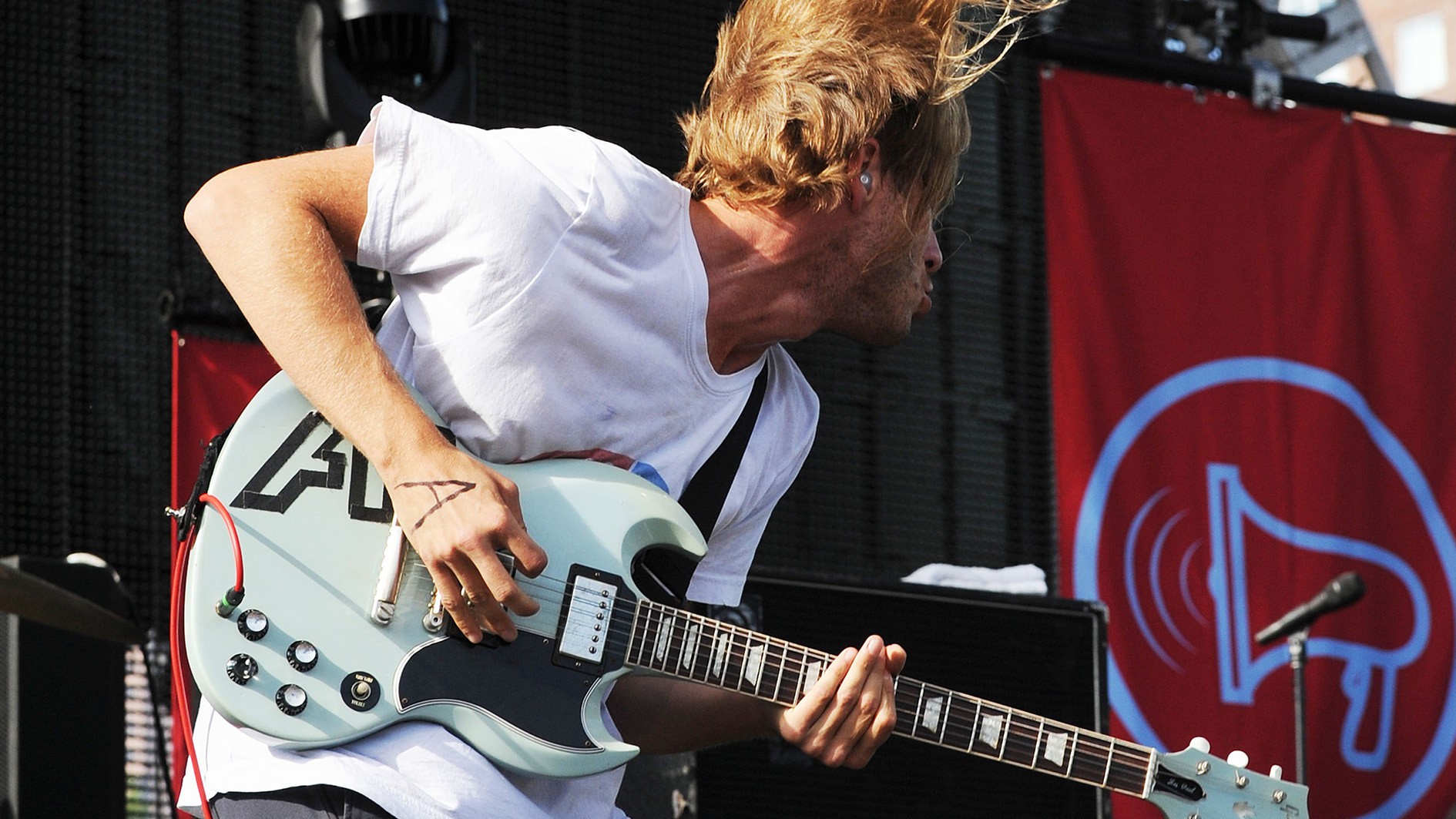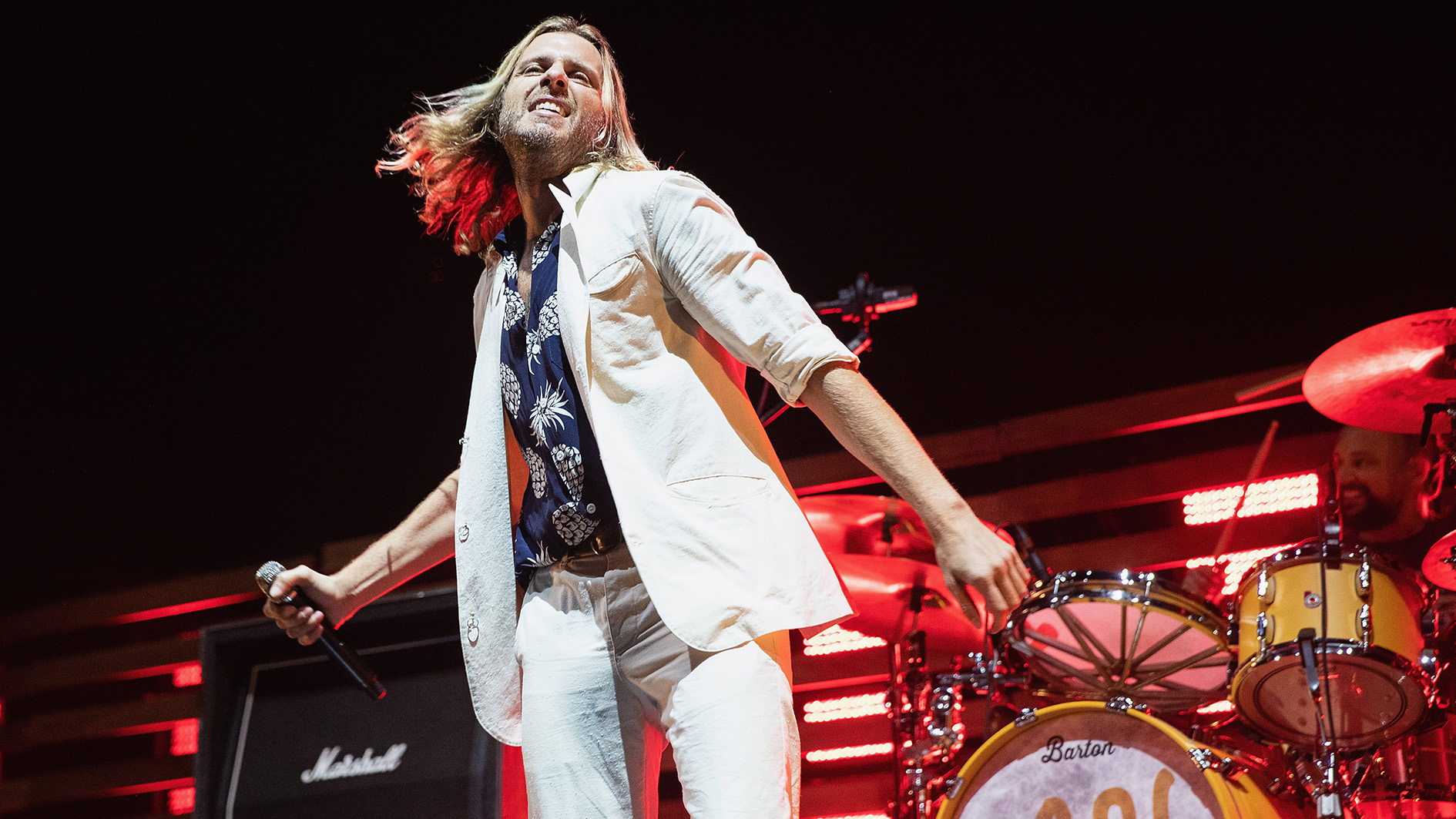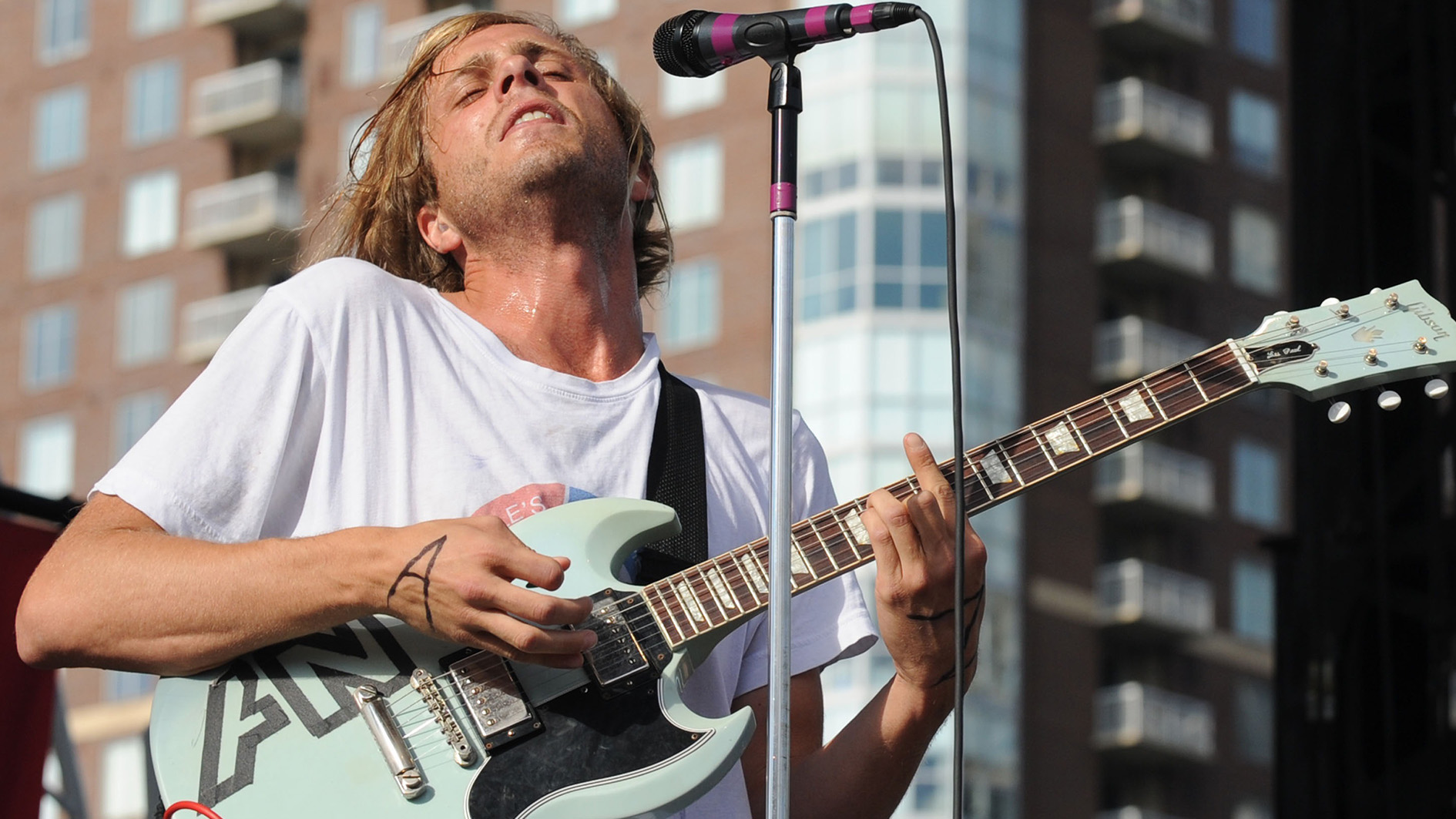AWOLNATION: "We want the musical ability to compete with anyone - whether it's Metallica or Miley Cyrus"
Frontman Aaron Bruno discusses the gear and ethos behind new album Angel Miners & Lightning Riders, including his collaboration with Weezer's Rivers Cuomo

When poised with the question ‘What felt different about album number four?’ Awolnation leader Aaron Bruno’s answer is probably best described as every guitar player’s ultimate nightmare, the extreme worst-case scenario end of misfortunes.
“For starters, the studio I built on my property burned down in the Californian Woolsey Fires,” says Bruno, talking to Guitar World from his home in Los Angeles. “That happened while I was on tour with Twenty One Pilots, so I was in Arizona playing and my wife was at home.
"To save you from the whole dramatic story, it sucked really bad. The good news was that my house didn’t burn to the ground, but everything around it did – from our cars to the music studio of my dreams with all my gear. It was a while before we could move back into the house…”
Eventually, after quite literally picking up the pieces, Bruno returned home and reflected on the huge loss - virtually all of his music equipment now gone forever. He also decided to start recording in new ways, slowly writing the 10 tracks that comprise latest album Angel Miners & The Lightning Riders.
The music was born from a bitter experience, but one that also had its own silver lining. After setting up a makeshift studio in a guest bedroom and moving a drumkit into his living room, the Awolnation singer/guitarist found himself fortuitously liberated and inspired…
“My living room has pretty tall wooden ceilings - it’s funny, my house is wooden and didn’t burn down somehow and that’s a whole other story. So just by nature, it was going to sound different, and though it was far from a studio, but there were a few things about the new setup that felt like a blessing in disguise. The drums ended up sounding pretty enormous and that’s down to the acoustics of a room I never would have recorded in if my studio hadn’t burned down…
“That also did suck for a while, if I wanted to go get a cup of coffee I’d trip over a snare drum or whatever - it wasn’t an ideal living situation. But I felt extremely lucky I had the space to do this. After touring the last record, I was so excited to start a new chapter in my life and almost make an album as if I had no other albums or fans. It was kind of a rebirth for me, a cleansing if you will. I wanted it to sounded ambitious and enormous, which came from a whole new approach to guitar…”
All the latest guitar news, interviews, lessons, reviews, deals and more, direct to your inbox!
We have to ask - did you manage to rescue your custom powder blue SG?
I have a Gibson ES reissue in red - it kinda looks like the guitar Michael J. Fox played in Back To The Future, which is probably why I was attracted to it
“Thank you for asking, thank you for knowing about it (laughs). I will tell you that I asked my wife to grab two guitars – that was one of them and there was also this 2001 ES hollowbody Gibson reissue in red. It kinda looks like the guitar Michael J. Fox played in Back To The Future, which is probably why I was attracted to it.
"So those are the two guitars that did survive… everything else burned. I had a 60s National electric in there… I could go on and on about the vintage drums that are in ashes and no more.
“But luckily I’ve never relied on instruments to make good songs. I rely on human emotion and the ability, especially in today’s day and age, to use production to make stuff sound great. I have a great engineer, the guys in my band are incredible players, especially my guitar player Zach Irons.
"I believe he’s one of the best guitarists alive right now. His father was Jack Irons from Red Hot Chili Peppers and played in Pearl Jam. He has this elite bloodline of musicianship, so I feel really lucky… despite all this terrible shit happening!”
What were the main amps and pedals for the recordings?
“I can’t say, because there wasn’t one main amp. For each song, I would want to get a different tone or have a different approach. Sometimes it would be a more traditional, organic-sounding amp and sometimes I would do weird shit like plug in my SG directly in with an octave pedal and no distortion at all, and just let that be the part. Or anything in between. I’m not a student of just one subject when it comes to guitar.
“Since I suck technically, I try to use inspiring and interesting tones to make me sound better than I am. When it comes to the fancy stuff or real technical ideas, that’s when I bring in Zach, to play the more beautiful stuff.
On California Halo Blue, that’s his Fender Strat which is a great combo with my SG - one is really bright and one is really dark. I tend to like muddy sounding guitars more, that’s just my taste. What makes it even nicer to listen to is when you add the glistening Strat on top of it."
There are some really boutique-sounding clean tones with added ambiences…
I don’t even know what the tuning for Guilty Filthy Soul was honestly. Somewhere in between D and E… definitely not right.
“Delays are so important. You could be playing something that’s so fucking boring, but put a delay on it and you sound like a genius. Even when you’re doing the most simple thing possible. My playing is very single-note.
"A lot of my heavier riffs are single-note with either an octave pedal or straight pitchshifter. There’s barely any bass guitar on this album, it’s either subs, synth bass or me playing my SG or hollowbody and literally turning it into a bass guitar.”
What kind of octavers and pitchshifters did you stick with?
“It was something new for each song, depending on what it called for. I don’t give out all our secrets because I feel very proud of the low-end we have. But I can tell you that sometimes people overthink their guitar recordings. You need to have this much and this a certain amount of inches from a certain speaker… I say just record the damn thing and it will sound good. There’s no reason to overthink it.
"On my first record, I recorded the song Guilty Filthy Soul with the first acoustic I learned how to play on and I don’t even know what the tuning was honestly. Somewhere in between D and E… definitely not right.
"I recorded it on Garageband, this was in 2009, and it ended up blowing up. The idea of distorted acoustic guitar sounded pretty cheesy to me but it sounded completely incorrect, like an AM radio from earlier times when there was loads of static. I still can’t get that tone live, I never will be able to.”
Those moments of imperfection can often be the most inspiring, it seems…
“Exactly, little accidents like that can be great. Even if you record your acoustic as a voice memo on your iPhone. Those sound great, man! Sometimes when I’m testing mixes, I might just put my phone up and record a voice memo. I’ll listen back that way.
"If it sounds like a stadium, that’s a good test. Your songs should sound good off your phone, in your car… I would force people to listen to my songs, a whole lifetime ago, and make them get in my car with the bass super loud. I could control the environment people listen in. It was like I had only have one chance to make an impression on someone’s ears.
"Now I’ve given up on that, I just want it to sound good on whatever they use to listen. God knows, most people will sample it on their phones before thinking about giving it a go in their car tomorrow. Sorry if I went on a rant, but I guess my point is keeping it simple can be a good thing sometimes!”
Rivers Cuomo from Weezer makes an appearance on Pacific Coast Highway In The Movies. How did the collaboration come about?
That was a really cool moment, for the muse to go full circle and someone who I looked up to telling me he liked me
"I love his voice, he’s one of my favorite singers and songwriters. I’ve loved the Blue album all the way from 16 to right now. I remember when they went away after Pinkerton, I just couldn’t understand. That was a genius album to me.
"I was at an age where I didn’t know how the business and industry worked, and how much he was affected by that - thinking it was a flop. For the rest of us, it was cherished like a Pixies or Radiohead album. Little did he know how much his army of fans had grown.
“I remember when they were playing some secret shows in LA and I was able to go and hear these new songs like Island In The Sun or Hash Pipe from the Green album before they were released. We became friends over the years after playing a few festivals.
"He reached out to me - I wasn’t going to reach out to him because he’s a busy guy - saying he was a fan of my songs, which totally blew my head off. I told him that I loved his harmonies, melodies and sense of songwriting. And he said to me, ‘Ah, that must be why I like your songs so much!’ That was a really cool moment, for the muse to go full circle and someone who I looked up to telling me he liked me.”

You mentioned Radiohead too, what kind of impact did they have on you?
“For me, it was OK Computer first. I remember seeing the video for Paranoid Android first. When it got to the long bridge section, where he sings ‘Rain down…’ I found myself so moved emotionally. I can’t remember what I was going through but it just struck a chord with me. I felt like they were The Beatles of our time as far as pushing the envelope.
"Since then, nothing’s come close. There have been moments of genius flaring up for sure, but as far as a group pushing the envelope that much… I haven’t seen anything like it. I’m sure it will happen at some point.
“That album blew my mind so much. Then I loved Kid A, Amnesiac, In Rainbows was huge for me… I guess Kid A blew my mind so much, nothing could blow my mind more than that ever again. They couldn’t top what they did there, all they could do is continue in their brilliance. Kid A changed everything. It’s almost like I remember life before Kid A and life after, when it comes to recording and what you could do with Pro-Tools.”
There are some heavier moments on Battered Black & Blue, Half Italian, I’m A Wreck. Where does that side of it come from?
Whether that’s a Pantera or Rage Against The Machine nod… it’s in me
“I grew up on the hardcore scene and loving metal, as well as hip-hop and everything else. There’s a fine line between rock that can be cheesy as hell, it can be wildly bad or really good. I hope I fall on the right line when it comes to power in riffs, stuff that feels out of this universe.
"I was lucky to be around these hardcore bands with crazy breakdowns. It would be hard for me to make a record that didn’t have some level of therapy through brutality. Whether that’s a Pantera or Rage Against The Machine nod… it’s in me.
“It’s also great to have a love of pop songs with more of a commercial appeal. When we go on stage, we still want that weaponry that can compete with any band, whether it’s Metallica - who we’ve shared the stage with a few times at different festivals - to Miley Cyrus.
"I like all kinds of music so I want to be able to compete with everybody. Right now it’s raining in LA. Tomorrow it might be sunny. As a band, you want to dress appropriately for whatever the weather… that’s a pretty out there parallel (laughs).”
Is it mainly amp overdrive you’re using, or are you stacking pedals?
“When it comes to recording, I do quite a bit of stacking. When we play live, it’s a little more traditional. Zach plays his Strat through a Marshall full stack. It’s actually a really special Strat that John Frusciante gave him. It’s pretty cool. He’s definitely more of a Strat schooled guy, where I’m more into the warmer tone from a Gibson that can hide most of my imperfections.
“If was to pick up a Strat, I would make a fool out of myself - you would look at me, point and say, ‘You’re a liar!’ You have to be pretty good to make a Strat sound good. Gibsons have a low end that’s easier to hide behind. It’s also like wearing clothes - what looks good on your body type.
"When I play a Les Paul, I look like a dumbass for some reason. It just doesn’t look good on me. While SGs and hollowbodies just sit on my shoulders right. Not everyone can wear the same pants or necklace, you know.”
What are your tips for mixing guitars with electronic sounds and beats?
I don’t even know what’s what now. Maybe that’s a good thing, the idea of genre can be a bit silly
“Again, there’s another fine line there. You can really stumble in the wrong direction and make something horrible. Being light-hearted about your music is a good thing. Some of my stuff makes me laugh when I hear it. If I had a riff idea, like the song I’m A Wreck, me and our drummer Isaac were laughing so hard tears were coming out of our eyes… it was that ridiculous.
"My favorite music is absolutely ridiculous, things that are so ambitious they teeter on the edge of complete flavor. Not being afraid of extremes or going to 11, sorry to use that reference, and then to zero all in the same song. Go into the dark side and find your way back to the light exploring everything in between. It’s also okay to sit right in the middle once in a while.
“As far as the dance stuff, whatever gets you going… I’m a child of the '80s. That was a real fun time for popular music. I’m not sure what pop music is right now, I don’t really understand. Alternative music has become straight pop in ways, I don’t even know what’s what now. Maybe that’s a good thing, the idea of genre can be a bit silly.”

There’s never been more kinds of crossover music - it definitely feels like the musicians of tomorrow will be even less defined by boundaries…
“The more we bend and mix genres together, the better we will be as a community of humans. I’d rather be on the forefront of something new than be successful on the heels of what has already happened.
"I’ve experienced a lot of bands ripping us off from our first record and obviously the breakout success with Sail. There are now 15 different Sails out there now, copying that song and these bands have intentionally done that.
“I’m not going to get too down on it, though it’s annoying sometimes when you hear something and go, ‘What is that, what are these guys doing right here?!’ I feel very flattered so many people have been influenced by it. Hopefully the circle keeps going on and people get inspired by this record as well.”
Amit has been writing for titles like Total Guitar, MusicRadar and Guitar World for over a decade and counts Richie Kotzen, Guthrie Govan and Jeff Beck among his primary influences as a guitar player. He's worked for magazines like Kerrang!, Metal Hammer, Classic Rock, Prog, Record Collector, Planet Rock, Rhythm and Bass Player, as well as newspapers like Metro and The Independent, interviewing everyone from Ozzy Osbourne and Lemmy to Slash and Jimmy Page, and once even traded solos with a member of Slayer on a track released internationally. As a session guitarist, he's played alongside members of Judas Priest and Uriah Heep in London ensemble Metalworks, as well as handled lead guitars for legends like Glen Matlock (Sex Pistols, The Faces) and Stu Hamm (Steve Vai, Joe Satriani, G3).

![B.B. King [left] cups his hands to his ear as he asks the crowd for more. Joe Bonamassa, with a Les Paul, gives his crowd a thumbs up](https://cdn.mos.cms.futurecdn.net/P3XrQLh86C27JfPp4AGp6n.jpg)